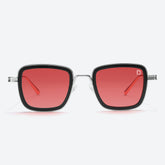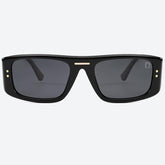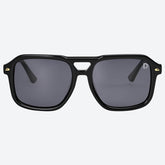Can I Use Polarized Sunglasses For Solar Eclipse?
A solar eclipse is a rare phenomenon, so it’s unsurprising that there’s always a buzz when the news pops up that you’re expecting one in your area. When preparing to view a solar eclipse, many wonder if their polarized sunglasses will suffice for eye protection. While polarized lenses are excellent for reducing glare in everyday situations, they are not designed to safeguard your eyes from the intense and harmful rays of the sun during an eclipse. Understanding the limitations of polarized sunglasses and the necessity of using proper eclipse glasses is crucial for eye safety. In this article, we will discuss the efficacy of polarized glasses for solar eclipse and the alternatives to use instead.
What Are Polarized Sunglasses?

Polarized Sunglasses are special sunglasses designed to reduce glare, which is the bright, reflected light that can hurt your eyes and make it hard to see. They are especially useful for activities like driving, fishing, and skiing, where glare from surfaces like roads, water, or snow can be very strong.
Dollger Polarized sunglasses have a unique filter in their lenses. This filter blocks out horizontal light waves, which are the main cause of glare. Normal light travels in all directions, but when it reflects off flat surfaces, it tends to become horizontal, causing that bright, annoying glare. The polarizing filter stops these horizontal waves, allowing only vertical light to pass through. This makes everything look clearer and more comfortable for your eyes.
One benefit of polarized sunglasses’ ability to reduce glare is that they help you see more clearly, making activities like driving safer. Also, colors often look more vivid with polarized lenses. It also reduces strain on your eyes because they don’t have to work as hard. Most polarized sunglasses are also manufactured to protect your eyes against the sun’s UV (ultraviolet) rays. However, they might not be the best for looking at screens like your phone or GPS, as they can sometimes make these displays harder to see.
How the Sun Affects Your Eyes?

The sun can harm your eyes in several ways, so looking directly at it is not advisable. The sun radiates ultraviolet (UV) rays, in addition to light and heat, and it can cause damage to your eyes over time. Some examples of the negative effects include conditions like cataracts (clouding of the eye's lens) and macular degeneration (damage to the retina). Prolonged exposure to bright sunlight can also cause immediate problems like photokeratitis, a painful condition similar to sunburn but on the eyes.
Glare from the sun can also make it hard to see, leading to eye strain and discomfort. It can be especially dangerous when driving or doing activities where clear vision is important. That’s why you should wear sunglasses like Dollger Polarized sunglasses that block UV rays and a hat with a brim to protect your eyes and reduce direct sunlight exposure.
Can I take off my glasses during the eclipse?
If you asked this question because you want to look directly at the sun, the answer is a resounding NO. You should NOT take off your solar eclipse glasses while looking at the sun during an eclipse, except during the brief phase of totality in a total solar eclipse. If you don’t intend to look directly at the sun, you may take off your glasses to look at your surroundings ALONE. Here’s a breakdown:
During a Total Solar Eclipse
- Partial Phases: During the partial phases before and after totality, the sun is still extremely bright and can cause serious eye damage. Keep your solar eclipse glasses on during these times.
- Totality: If you are in the path of totality, there will be a brief period (a few minutes at most) when the moon completely covers the sun. During this time, removing your glasses and looking directly at the sun is safe. You can safely see the sun’s corona, the outer atmosphere, without glasses. Once the sun begins to reappear, put your glasses back on immediately.
During a Partial or Annular Eclipse
During a partial eclipse, the sun is never completely covered, so you must always keep your solar eclipse glasses on when looking at the sun.
Remember, looking directly at the sun without proper eye protection, even for a short time, can cause permanent eye damage, so always use solar eclipse glasses specifically designed for this purpose.
Can I Use Polarized Sunglasses For Solar Eclipse?
No, you should not use polarized sunglasses to view a solar eclipse. Polarized sunglasses are designed to reduce glare and improve visual comfort in bright conditions. Still, they do not provide sufficient protection against intense light and harmful ultraviolet (UV) rays from the sun during a solar eclipse.
Why Polarized Sunglasses Are Not Safe?
- Insufficient Protection: Polarized sunglasses do not block enough of the sun’s intense visible and invisible light. They are not designed to filter out the harmful levels of light that occur during a solar eclipse.
- Risk of Eye Damage: Looking directly at the sun during an eclipse without adequate protection can cause serious and permanent damage to your eyes, including solar retinopathy—damage to the retina from intense solar radiation.
Safe Alternatives to Polarized Sunglasses During An Eclipse
- Solar Eclipse Glasses: Use glasses specifically designed for viewing solar eclipses. These glasses have special lenses made from black polymer or silver-coated Mylar that block out 99.999% of sunlight, including harmful UV and infrared rays.
- Solar Filters for Telescopes and Binoculars: If you want to use optical instruments to view the eclipse, ensure they are equipped with proper solar filters.
What Are Solar Eclipse Glasses Made Of?
Solar eclipse glasses are made of special materials designed to protect your eyes from the sun's intense light during an eclipse. The main components include:
- Black Polymer or Silver-Mylar Film: The lenses of solar eclipse glasses are typically made from black polymer or a thin layer of aluminium-coated Mylar. Mylar can absorb light partially and is inexpensive to produce, making it a popular choice. The aluminum coating on the outer part of the mylar film makes it very reflective. So, the lens effectively blocks harmful ultraviolet (UV), visible, and infrared light, allowing only a small fraction of sunlight to pass through.
- Cardboard or Plastic Frames: The frames are usually made from lightweight cardboard or plastic to keep the protective lenses in place. The design is simple and lightweight for easy use during the brief period of an eclipse.
These materials ensure that only a tiny fraction of sunlight, typically about 0.003%, reaches your eyes, making it safe to look directly at the sun during an eclipse. Regular sunglasses are unsafe for this purpose, as they do not block enough sunlight and UV rays.
Benefits Of Polarized Sunglasses
Polarized sunglasses offer several benefits that enhance visual comfort and protect your eyes from the harmful effects of glare. Here are the key advantages:
- Reduces Glare: Polarized lenses filter out horizontal light waves that cause glare, especially from reflective surfaces like water, snow, and roads. This makes it easier to see clearly in bright conditions.
- Improves Visual Comfort: Polarized sunglasses reduce eye strain and discomfort by reducing glare, making it more comfortable to be outdoors in bright sunlight.
- Enhances Visual Clarity and Contrast: These lenses help enhance the contrast and sharpness of objects, making details more visible and improving overall visual clarity.
- Reduces Eye Fatigue: With less glare to deal with, your eyes don’t have to work as hard, reducing fatigue and strain, especially during prolonged outdoor activities.
- Improves Safety: Better visibility and reduced glare can enhance safety in activities such as driving, cycling, and boating, where clear vision is crucial.
- Protects Against UV Rays: Many polarized sunglasses, like Dollger Polarized sunglasses, also offer UV protection, shielding your eyes from harmful ultraviolet rays that can cause long-term eye damage.
- Better Color Perception: Polarized lenses can make colors appear more vivid and true to life, improving the overall visual experience.
Ideal Uses for Polarized Sunglasses
- Driving: Reduces glare from the road and other vehicles, improving safety and comfort.
- Water Activities: Perfect for fishing, boating, and beach activities where glare from water is intense.
- Snow Sports: Helps reduce glare from snow, enhancing visibility and contrast on the slopes.
- Everyday Outdoor Activities: Great for hiking, walking, and other outdoor activities in bright sunlight.
While polarized sunglasses are excellent for reducing glare and enhancing visual comfort, they may not be suitable for all situations, such as viewing LCD screens or flying, where polarized lenses can sometimes interfere with reading displays. They’re also not ideal for viewing a solar eclipse.
Flaunt Your Style With Dollger Polarized Sunglasses

Dollger Polarized Sunglasses offer superior protection and comfort. With UV protection, our sunglasses shield your eyes from harmful rays, making them perfect for any outdoor activity. The lenses reduce glare, enhancing visual clarity and comfort. These sunglasses are also durable and lightweight, ensuring long-lasting wear without discomfort. Choose from several stylish frame shapes to match your personal style. Whether you’re driving, hiking, or just enjoying a sunny day, Dollger Polarized Sunglasses provide the perfect blend of functionality and fashion, ensuring your eyes stay protected and your look stays sharp.
Final Note
In conclusion, polarized sunglasses are not safe for viewing a solar eclipse. They do not provide adequate protection against the sun’s intense light and harmful UV rays during an eclipse. Always use certified solar eclipse glasses or proper solar viewing equipment to protect your eyes and ensure a safe and enjoyable eclipse experience.





